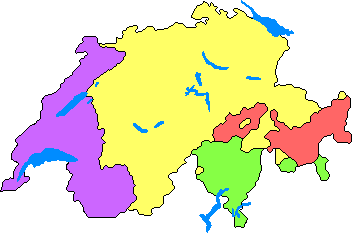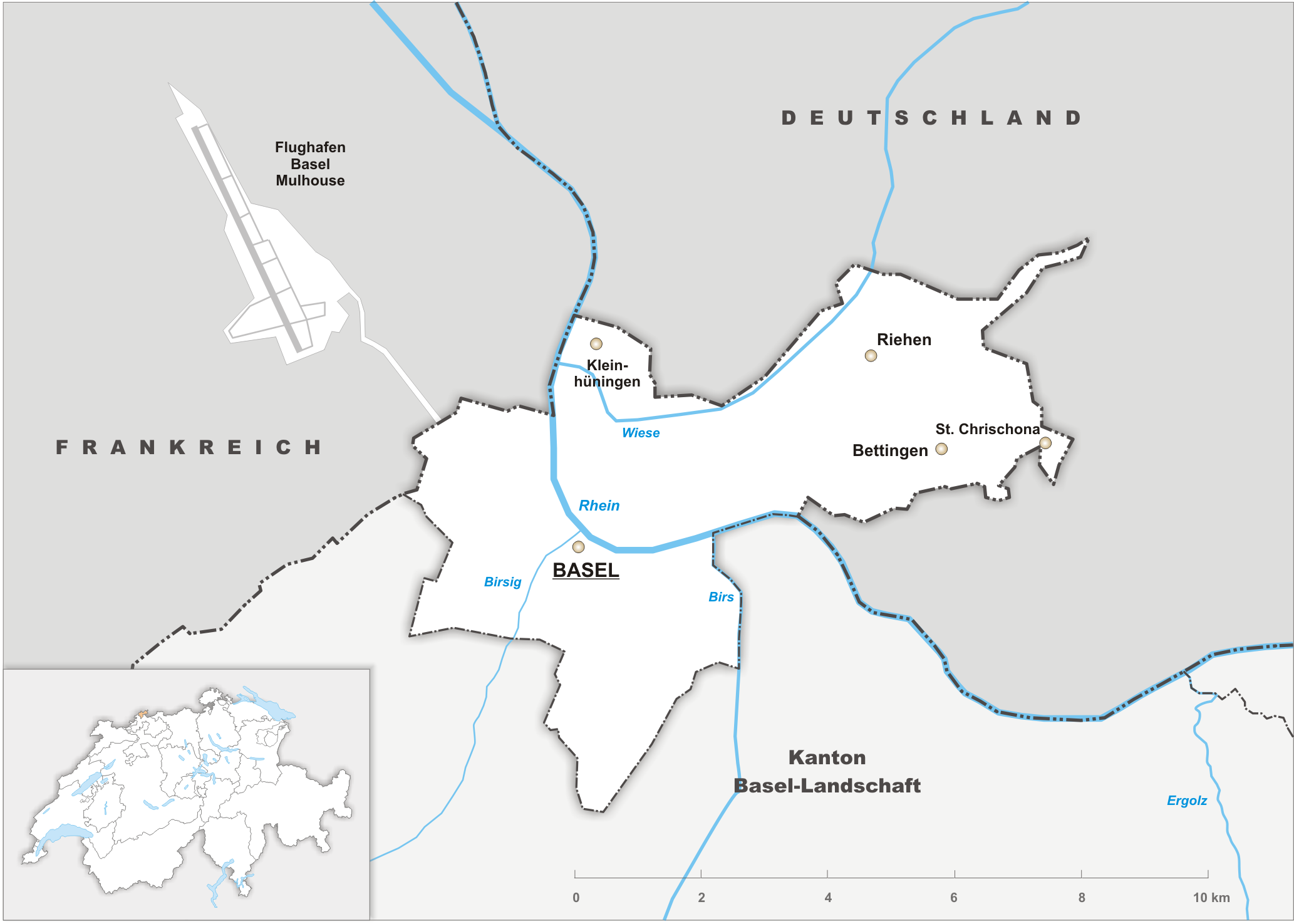|
Basel German
Basel German or Baseldytsch (Standard German: ''Baseldeutsch'') is the dialect of the city of Basel, Switzerland. The dialect of Basel forms a Low Alemannic linguistic exclave in the High Alemannic region. Phonetics and phonology Consonants Aspirated plosives Basel German is characterised by aspirates which are absent or at least less common in other dialects. Compare Basel German ''Khind'' (usually spelled ''Kind''), pronounced more or less as Standard German ''Kind'', with ''Chind'' with initial , used in all other Swiss German dialects, with the exception of the dialect of Chur. Thus, Basel German did not complete the second Germanic sound shift ( High German consonant shift). Nowadays, many speakers pronounce the (or � to be more exact), however. There are nevertheless still words that are never pronounced with , for example ''kenne'' (Standard German kennen, to know) or ''Keenig''/''König'' (Standard German ''König''). Typically, words from Standard German or Latin ... [...More Info...] [...Related Items...] OR: [Wikipedia] [Google] [Baidu] |
Dialect
The term dialect (from Latin , , from the Ancient Greek word , 'discourse', from , 'through' and , 'I speak') can refer to either of two distinctly different types of linguistic phenomena: One usage refers to a variety of a language that is a characteristic of a particular group of the language's speakers. Under this definition, the dialects or varieties of a particular language are closely related and, despite their differences, are most often largely mutually intelligible, especially if close to one another on the dialect continuum. The term is applied most often to regional speech patterns, but a dialect may also be defined by other factors, such as social class or ethnicity. A dialect that is associated with a particular social class can be termed a sociolect, a dialect that is associated with a particular ethnic group can be termed an ethnolect, and a geographical/regional dialect may be termed a regiolectWolfram, Walt and Schilling, Natalie. 2016. ''American Engli ... [...More Info...] [...Related Items...] OR: [Wikipedia] [Google] [Baidu] |
Basel, Switzerland
, french: link=no, Bâlois(e), it, Basilese , neighboring_municipalities= Allschwil (BL), Hégenheim (FR-68), Binningen (BL), Birsfelden (BL), Bottmingen (BL), Huningue (FR-68), Münchenstein (BL), Muttenz (BL), Reinach (BL), Riehen (BS), Saint-Louis (FR-68), Weil am Rhein (DE-BW) , twintowns = Shanghai, Miami Beach , website = www.bs.ch Basel ( , ), also known as Basle ( ),french: Bâle ; it, Basilea ; rm, label=Sutsilvan, Basileia; other rm, Basilea . is a city in northwestern Switzerland on the river Rhine. Basel is Switzerland's third-most-populous city (after Zürich and Geneva) with about 175,000 inhabitants. The official language of Basel is (the Swiss variety of Standard) German, but the main spoken language is the local Basel German dialect. Basel is commonly considered to be the cultural capital of Switzerland and the city is famous for its many museums, including the Kunstmuseum, which is the first collection of art accessible to the p ... [...More Info...] [...Related Items...] OR: [Wikipedia] [Google] [Baidu] |
Low Alemannic German
Low Alemannic German (german: Niederalemannisch) is a branch of Alemannic German, which is part of Upper German. Its varieties are only partly intelligible to non-Alemannic speakers. Subdivisions *Lake Constance Alemannic ( de) **Northern Vorarlberg ( de) **Allgäu dialect ( de) ** Baar dialect **Southern Württemberg * Upper Rhenish Alemannic ( de) **Basel German **Baden dialects north of Markgräflerland ** Alsatian, spoken in Alsace, in some villages of the Phalsbourg county in Lorraine and by some Amish in Indiana **Low Alemannic dialects in the Black ForestNoble, Cecil A. M. (1983). ''Modern German dialects'' New York .a. Lang, p. 67/68 ** Colonia Tovar dialect, Venezuela Features The feature that distinguishes Low Alemannic from High Alemannic is the retention of Germanic /k/, for instance ''kalt'' 'cold' vs. High Alemannic ''chalt''. The feature that distinguishes Low Alemannic from Swabian is the retention of the Middle High German Middle High German (MHG; germ ... [...More Info...] [...Related Items...] OR: [Wikipedia] [Google] [Baidu] |
High Alemannic
High Alemannic is a dialect of Alemannic German spoken in the westernmost Austrian state of Vorarlberg and in Switzerland and Liechtenstein. Language area The High Alemannic dialects are spoken in Liechtenstein and in most of German-speaking Switzerland (Swiss Plateau), except for the Highest Alemannic dialects in the Swiss Alps and for the Low Alemannic (Basel German) dialect in the North West. Therefore, High Alemannic must not be confused with the term "Swiss German", which refers to all Alemannic dialects of Switzerland as opposed to Swiss variant of Standard German, the literary language of diglossic German-speaking Switzerland. In Germany, High Alemannic dialects are spoken in Southern Baden-Württemberg, i.e. the Markgräflerland and in the adjacent area south of Freiburg im Breisgau up to the Black Forest ( Schönau). It is also spoken in the southern Sundgau region beyond the Upper Rhine, which is part of Alsace, France. In Vorarlberg in Western Austria, a form of ... [...More Info...] [...Related Items...] OR: [Wikipedia] [Google] [Baidu] |
High German Consonant Shift
In historical linguistics, the High German consonant shift or second Germanic consonant shift is a phonological development ( sound change) that took place in the southern parts of the West Germanic dialect continuum in several phases. It probably began between the third and fifth centuries and was almost complete before the earliest written records in High German were produced in the eighth century. From Proto-Germanic, the resulting language, Old High German, can be neatly contrasted with the other continental West Germanic languages, which for the most part did not experience the shift, and with Old English, which remained completely unaffected. General description The High German consonant shift altered a number of consonants in the southern German dialects – which includes Standard German, Yiddish, and Luxembourgish – and so explains why many German words have different consonants from the related words in English, Dutch and the Scandinavian languages. The term is some ... [...More Info...] [...Related Items...] OR: [Wikipedia] [Google] [Baidu] |
Carnival Of Basel
The Carnival of Basel (german: Basler Fasnacht) is the biggest carnival in Switzerland and takes place annually between February and March in Basel. It has been listed as one of the top fifty local festivities in Europe. Since 2017, the Carnival of Basel has been included in UNESCO's intangible cultural heritage. Overview The ''Basler Fasnacht'' starts on the Monday after Ash Wednesday at precisely 4:00 am with the so-called ''Morgestraich'' ( see below). The carnival lasts for exactly 72 hours and, therefore, ends on Thursday morning at 4:00 am. During this time the ''Fasnächtler'' (the participants) dominate the old town of central Basel, running free in the streets and restaurants. Basler Fasnacht is often referred to as ''die drey scheenschte Dääg'' ("the three most beautiful days"). Unlike the Carnival celebrations held in other cities on the Rhine (such as those in Cologne, Mainz and Düsseldorf), the Basel Carnival features a clear and well-maintained sepa ... [...More Info...] [...Related Items...] OR: [Wikipedia] [Google] [Baidu] |
Herbert Pilch
Herbert Pilch (13 February 1927 – 19 April 2018) was a German linguist and celtologist. He was a professor of English language and literature at the University of Freiburg. His contributions to linguistics included a theory of phonemes and studies of Basel German. His main work is the ''Manual of English Phonetics''. In 2008 he was awarded the Order of Merit of the Federal Republic of Germany The Order of Merit of the Federal Republic of Germany (german: Verdienstorden der Bundesrepublik Deutschland, or , BVO) is the only federal decoration of Germany. It is awarded for special achievements in political, economic, cultural, intellect .... Works * ''Phonemtheorie'' (Basel 1964) * ''Empirical Linguistics'' (Munich 1976) * ''Manual of English Phonetics'' (Munich 1994) * ''Altenglischer Lehrgang + Altenglische Grammatik'' (Munich 1970) * ''Sound, Sense, and System. Herbert Pilch and Postwar German Studies in English Linguistics'' (1955–1985) (Heidelberg 1987) * ''Die keltisc ... [...More Info...] [...Related Items...] OR: [Wikipedia] [Google] [Baidu] |
Matthäus Merian by Bach
{{given name, type=both ...
Matthäus is a given name or surname. Notable people with the name include: ;Surname * Lothar Matthäus, (born 1961), German former football player and manager ;Given name * Matthäus Aurogallus, Professor of Hebrew at the University of Wittenberg * Matthäus Daniel Pöppelmann, German master builder who helped to rebuild Dresden after the fire of 1685 * Matthäus Lang von Wellenburg, German statesman and archbishop of Salzburg * Matthäus Merian, Swiss engraver See also * Matthias * Matthew (name) * St Matthew Passion The ''St Matthew Passion'' (german: Matthäus-Passion, links=-no), BWV 244, is a '' Passion'', a sacred oratorio written by Johann Sebastian Bach in 1727 for solo voices, double choir and double orchestra, with libretto by Picander. It se ... [...More Info...] [...Related Items...] OR: [Wikipedia] [Google] [Baidu] |
Swiss German Language
Swiss German (Standard German: , gsw, Schwiizerdütsch, Schwyzerdütsch, Schwiizertüütsch, Schwizertitsch Mundart,Because of the many different dialects, and because there is no defined orthography for any of them, many different spellings can be found. and others) is any of the Alemannic dialects spoken in the German-speaking part of Switzerland and in some Alpine communities in Northern Italy bordering Switzerland. Occasionally, the Alemannic dialects spoken in other countries are grouped together with Swiss German as well, especially the dialects of Liechtenstein and Austrian Vorarlberg, which are closely associated to Switzerland's. Linguistically, Alemannic is divided into Low, High and Highest Alemannic, varieties all of which are spoken both inside and outside Switzerland. The only exception within German-speaking Switzerland is the municipality of Samnaun, where a Bavarian dialect is spoken. The reason Swiss German dialects constitute a special group is their a ... [...More Info...] [...Related Items...] OR: [Wikipedia] [Google] [Baidu] |
Basel
, french: link=no, Bâlois(e), it, Basilese , neighboring_municipalities= Allschwil (BL), Hégenheim (FR-68), Binningen (BL), Birsfelden (BL), Bottmingen (BL), Huningue (FR-68), Münchenstein (BL), Muttenz (BL), Reinach (BL), Riehen (BS), Saint-Louis (FR-68), Weil am Rhein (DE-BW) , twintowns = Shanghai, Miami Beach , website = www.bs.ch Basel ( , ), also known as Basle ( ),french: Bâle ; it, Basilea ; rm, label= Sutsilvan, Basileia; other rm, Basilea . is a city in northwestern Switzerland on the river Rhine. Basel is Switzerland's third-most-populous city (after Zürich and Geneva) with about 175,000 inhabitants. The official language of Basel is (the Swiss variety of Standard) German, but the main spoken language is the local Basel German dialect. Basel is commonly considered to be the cultural capital of Switzerland and the city is famous for its many museums, including the Kunstmuseum, which is the first collection of art accessibl ... [...More Info...] [...Related Items...] OR: [Wikipedia] [Google] [Baidu] |
Basel-Stadt
Basel-Stadt or Basel-City (german: Kanton ; rm, Chantun Basilea-Citad; french: Canton de Bâle-Ville; it, Canton Basilea Città) is one of the 26 cantons forming the Swiss Confederation. It is composed of three municipalities with Basel as the capital. It is traditionally considered a "half-canton", the other half being Basel-Landschaft, its rural counterpart. Basel-Stadt is one of the northernmost and lowest cantons of Switzerland, and the smallest by area. The canton lies on both sides of the Rhine and is very densely populated. The largest municipality is Basel, followed by Riehen and Bettingen. The only canton sharing borders with Basel-Stadt is Basel-Landschaft to the south. To the north of Basel-Stadt are France and Germany, with the tripoint being in the middle of the Rhine. Together with Basel-Landschaft, Basel-Stadt was part of the canton of Basel, who joined the Old Swiss Confederacy in 1501. Political quarrels and armed conflict led to the partition of the canto ... [...More Info...] [...Related Items...] OR: [Wikipedia] [Google] [Baidu] |



